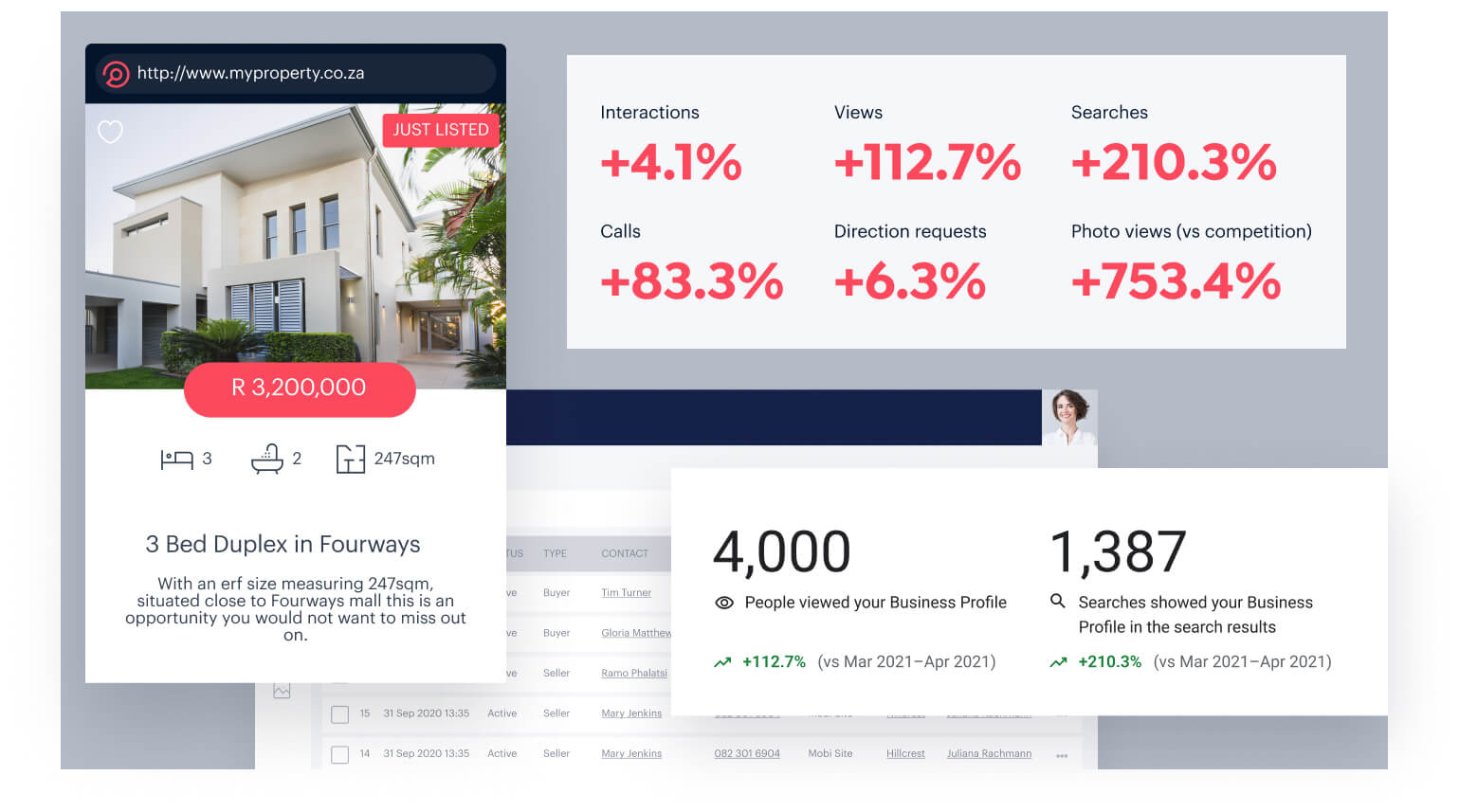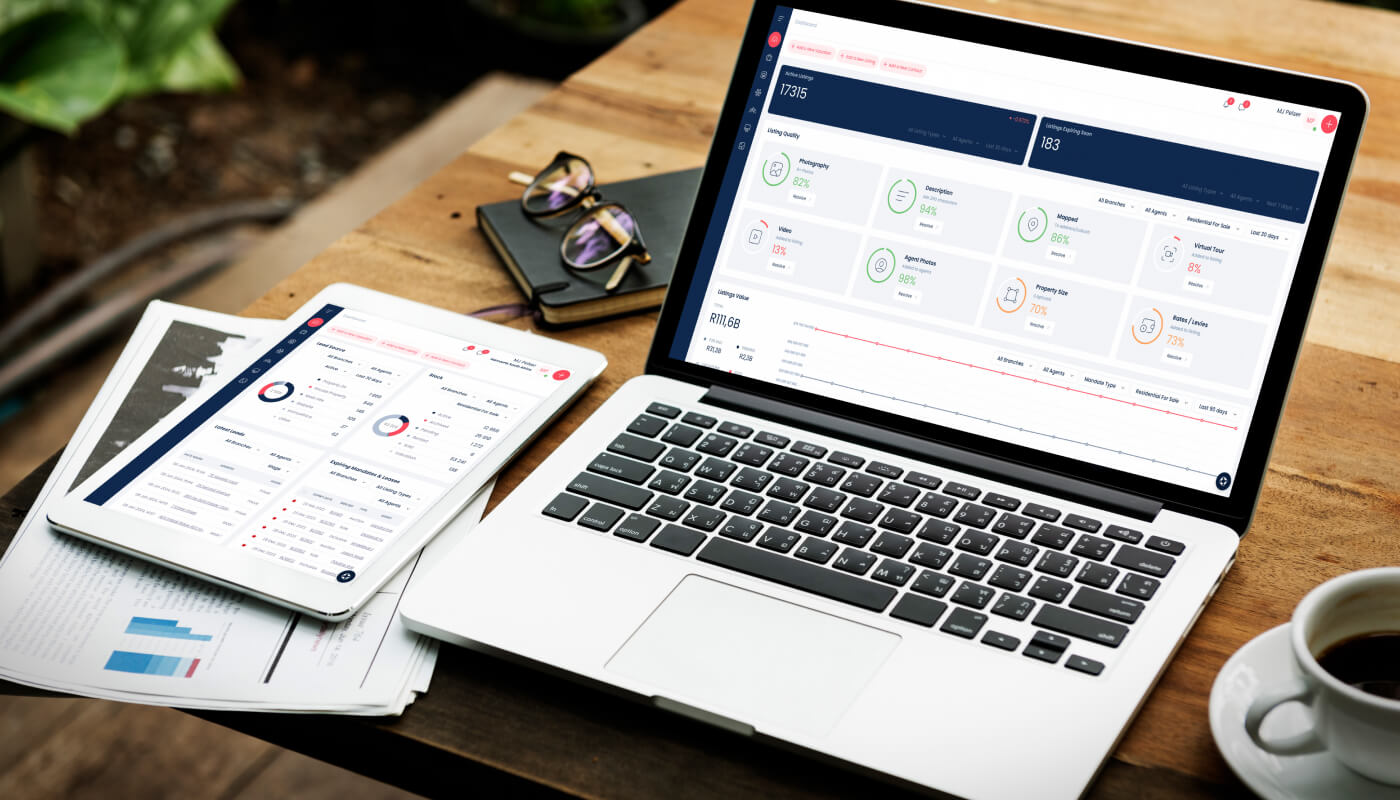The real estate landscape is evolving so the need for efficient tools to streamline operations and enhance client interactions is important. CRM software has emerged as a game-changer, offering property practitioners and real estate businesses a comprehensive solution to manage leads, automate communications, and create lasting relationships.
In this page, we will dive into the dynamic world of real estate CRMs, exploring the diverse features that empower professionals to stay organised, responsive, and ahead of the curve in an increasingly competitive market. From lead generation to transaction management, you will discover how CRM software will transform your real estate experience, creating a seamless and client-centric approach that pushes your business to new heights.
What you will learn:

A real estate customer relationship management (CRM) system is a robust and specialised software designed to revolutionise how professionals in the real estate industry manage relationships, leads, and transactions. At its core, a real estate CRM is a centralised hub that consolidates and organises client information, streamlining communication and fostering efficient collaboration. It goes beyond traditional contact management by offering features tailored to the real estate workflow, such as lead tracking, automated follow-ups, and transaction management. Real estate businesses use CRM tools to nurture leads, analyse client preferences, and deliver personalised experiences, ultimately fostering long-term relationships.
This technology enables real estate professionals to stay organised, responsive and proactive in a dynamic market. From managing property listings to coordinating showings and sales, a real estate CRM enhances productivity, reduces manual tasks and empowers practitioners to focus on what they do best: building meaningful connections and facilitating successful real estate transactions. At a time when customer experience is at the forefront, a real estate CRM is a pivotal tool that elevates service standards and helps professionals thrive in the competitive and ever-evolving real estate landscape.

A real estate CRM system is indispensable for businesses, acting as the technological backbone that transforms operations and client interactions. At the heart of a CRM is the ability to centralise and organise vast amounts of client data. In a dynamic industry where relationships are important, having a comprehensive database that houses client preferences, transaction histories, and communication logs ensures that no crucial detail is overlooked.
One of the primary reasons a CRM is crucial for real estate is for lead management. Effective lead tracking is the lifeblood of any successful business, In the real estate realm, where opportunities can be fleeting, a CRM becomes an invaluable asset as a real estate lead management system. By capturing and categorising leads, property practitioners can systematically nurture prospects, automating follow-ups and ensuring that no potential client falls through the cracks. This not only enhances efficiency but also contributes to a more personalised client experience, as practitioners can tailor their interactions based on the insights taken from the CRM's data repository.
In the competitive landscape of real estate, responsiveness is key. A CRM facilitates swift and targeted communication by providing a centralised platform for email templates, campaigns and scheduled follow-ups. Automation features not only save time but also contribute to consistency in client engagement. Whether it's sending personalised property suggestions, updates on market trends, or reminders for upcoming appointments, a CRM ensures that practitioners remain proactive and clients feel well-informed throughout their real estate journey.
Transaction management is another great aspect of CRM. Coordinating the countless details involved in real estate transactions can be a logistical challenge, but a CRM streamlines the process by offering tools for document storage, task management and timeline tracking. Practitioners can monitor each stage of a transaction, from listing to closing, ensuring that deadlines are met, documents are in order and clients are kept informed at every step. This not only minimises the risk of oversights but also contributes to a seamless and transparent experience for clients, creating trust and satisfaction.
Beyond individual transactions, a CRM aids in building lasting relationships with clients. By providing a comprehensive view of client preferences, interactions and feedback, practitioners can offer a more personalised and attentive service. Remembering a client's specific preferences or milestones in their homeownership journey adds a personal touch that can set an agency apart. The ability to anticipate client needs, whether it's sending anniversary reminders for home purchases or offering tailored property suggestions, strengthens the client-practitioner relationship, and encourages repeat business and referrals.
Staying ahead of trends is essential. A CRM equips businesses with analytical tools that offer insights into market trends, client behaviour and the effectiveness of marketing strategies. By analysing data on property performance, lead conversion rates and client engagement, agencies and brokerages can refine their approaches, allocate resources wisely, and make informed decisions to stay competitive in a crowded market.
In a team-based industry, where multiple practitioners and support staff may be involved in a single transaction, having a centralised platform for communication and task management fosters cohesion. Everyone involved in a deal can access the same up-to-date information, reducing the risk of miscommunication, and ensuring that the client receives a consistent and coordinated service.
A CRM is not just a tool, it's a strategic asset that empowers real estate professionals to thrive in a competitive and rapidly evolving industry. From lead management and transaction coordination to personalised client interactions and market trend analysis, the benefits of a CRM extend across every part of a real estate business. As technology continues to shape the future of the industry, embracing a CRM system is not just an option but a necessity for those looking to not only survive but thrive in the dynamic world of real estate.

A real estate customer relationship management (CRM) system operates as a multifaceted platform, using several tools and features to enhance efficiency, streamline operations, and optimise client interactions. It works by centralising and organising vast amounts of data related to clients, leads, properties and transactions.
The journey typically begins with lead management. A CRM acts as a dynamic repository for leads, capturing information from various sources such as website inquiries, social media interactions, or open-house contact lists. Leads are systematically categorised, allowing practitioners to prioritise and nurture them effectively. Automated lead scoring mechanisms can be implemented, assigning values based on factors like engagement level or expressed interest, aiding in the identification of hot prospects. As leads progress through the sales funnel, the CRM automates follow-up processes. Customisable campaigns enable practitioners to set up a series of automated emails tailored to different stages of the buying or selling process. This not only ensures that leads remain engaged but also allows practitioners to deliver timely and relevant information, gradually building a rapport and guiding leads toward conversion.
Communication lies at the heart of any successful real estate endeavour, and a CRM facilitates streamlined and targeted communication. Practitioners can use a CRM to send personalised emails, schedule follow-ups and track client interactions. Email templates can also be crafted and stored within the system, ensuring consistent and professional communication. Automated responses can be triggered based on predefined events or client actions, further enhancing responsiveness and client satisfaction.
Transaction management is a pivotal aspect of real estate, and a CRM excels in organising the countless details involved in property transactions. From listing to closing, the CRM serves as a central hub for storing and managing documents, tracking tasks and monitoring timelines. This feature helps practitioners stay on top of critical deadlines, keeps documents in order and assists in keeping clients informed throughout the entire process. Automated reminders can be set for key milestones, minimising the risk of oversights and contributing to a seamless transaction experience.
Client relationship management extends beyond individual transactions, and a CRM excels in building and maintaining lasting relationships. By providing a comprehensive view of client preferences, communication history, and transaction details, practitioners can offer personalised and attentive service. The CRM acts as a virtual assistant, reminding practitioners of important client milestones and preferences, and even sending personalised greetings for birthdays or anniversaries. This level of personalised service not only strengthens the client-practitioner relationship but also encourages repeat business and referrals.
Market insights are crucial for success in real estate, and a CRM provides analytical tools to provide valuable insights. By analysing data on lead conversion rates, property performance, and marketing effectiveness, practitioners can refine their strategies and make data-driven decisions. This feature allows real estate professionals to stay ahead of market trends, adjust their approaches and allocate resources more effectively.
Collaboration is streamlined through a CRM, particularly in a team-based industry such as real estate. Multiple practitioners and support staff involved in a single transaction can access the same up-to-date information. This ensures that everyone is on the same page, reducing the risk of miscommunication and providing clients with a consistent and coordinated service.
Essentially, a real estate CRM operates as a comprehensive ecosystem, seamlessly integrating lead management, communication, transaction coordination, and analytics. The system's intuitive interface and automation features empower practitioners to focus on building relationships and providing exceptional service, confident that the CRM is handling the logistical intricacies of their business. As the real estate industry continues to evolve, embracing a CRM becomes not just a technological choice but a strategic one.

As real estate professionals work through the twists and turns of the industry, these handy CRM features pop up as game-changers. A good real estate CRM will streamline operations, enhance client interactions, and contribute to overall business success.
Lead management
The heart of any real estate CRM is its lead management capabilities. Efficient lead tracking allows practitioners to capture, categorise, and prioritise leads seamlessly. Automated lead scoring mechanisms aid in identifying high-potential prospects, ensuring that property practitioners focus their efforts on the most promising opportunities.
Communication tools
Communication is a huge part of successful real estate transactions. CRM systems offer robust communication tools, including email integration, automated follow-ups, and customisable campaigns. Email templates streamline communication, ensuring consistency and professionalism. Automated responses based on predefined triggers enhance responsiveness, keeping clients engaged throughout the buying or selling process.
Transaction management
Coordinating the many details involved in real estate transactions can be daunting. A CRM simplifies this process with transaction management features. From document storage and task management to timeline tracking, the CRM becomes a central hub for all transaction-related information. Automated reminders for critical milestones minimise the risk of oversights, contributing to a seamless and organised transaction experience.
Client relationship building
Beyond individual transactions, a CRM excels in fostering lasting relationships with clients. By providing a comprehensive view of client preferences, transaction history, and communication records, practitioners can offer a personalised and attentive service. Automated reminders for client milestones, such as birthdays or home purchase anniversaries, add a thoughtful touch that strengthens the client-practitioner relationship.
Market insights and analytics
Staying ahead of market trends is crucial for success in real estate. CRM systems offer analytical tools that provide valuable insights into lead conversion rates, property performance, and marketing effectiveness. By leveraging these insights, practitioners can refine their strategies, make informed decisions, and adapt to the ever-changing dynamics of the real estate market.
Document management
Real estate transactions involve a plethora of documents, and a CRM simplifies the document management process. Practitioners can upload, store and share documents securely within the CRM, ensuring that all stakeholders have access to the necessary information. This feature not only enhances collaboration but also contributes to a paperless and organised workflow.
Task automation
Efficiency is paramount in real estate, and task automation features in a CRM streamline routine processes. From automated follow-ups to task reminders, practitioners can reduce manual workload and ensure that critical tasks are addressed promptly. This allows professionals to focus on high-value activities that contribute to business growth.
Mobile accessibility
In a fast-paced industry where mobility is key, CRM systems with mobile accessibility empower practitioners to stay connected and productive on the go. Whether it's accessing client information, responding to inquiries or managing tasks, a mobile-friendly CRM ensures that practitioners can effectively navigate their responsibilities from any location.
In the real estate game, your success boils down to how well you handle relationships, make transactions a breeze, and roll with the market punches. Picture a feature-packed CRM as your sidekick, tying all these must-haves into one neat package. It's your go-to for managing leads, nailing communication, and crunching those crucial analytics.

Navigating the world of real estate CRM software feels like stepping into a diverse and ever-changing landscape. There's a tool for every twist and turn, each tailored to meet the unique needs of the industry. The platforms available act as personalised sidekicks, working behind the scenes to make operations smoother, client connections stronger, and insights more valuable for people in the real estate game. Here are some examples of real estate CRM software that have personally left their mark on the industry.
Salesforce
Renowned for its versatility, Salesforce is a widely used CRM platform across various industries, including real estate. Its robust customisation options and extensive app marketplace make it adaptable to the specific needs of real estate professionals. With features like lead management, opportunity tracking, and workflow automation, Salesforce provides a comprehensive solution for property practitioners and real estate businesses.
Hubspot
HubSpot offers a user-friendly CRM solution that seamlessly integrates with its suite of marketing, sales and service tools. While the CRM itself is free, HubSpot provides advanced features through its paid plans. Real estate professionals can benefit from contact and lead management, email tracking and task automation, creating a cohesive and efficient system for client interactions.
Zoho CRM
Zoho CRM is a versatile and affordable solution suitable for real estate businesses of all sizes. It offers lead and contact management, pipeline tracking, and workflow automation. The platform's scalability makes it a viable choice for individual practitioners, small teams, or larger agencies. Zoho CRM also integrates with other Zoho applications, providing a comprehensive suite of business tools.
Prop Data
Regarded as one of the top real estate CRMs, Prop Data delivers an affordable, robust CRM solution designed for the real estate industry. With features like lead generation and management, automated marketing and transaction coordination, it streamlines operations for real estate professionals. Its user-friendly interface and customisation options make it a standout choice, empowering users to tailor the system to their specific needs with ease. The CRM also integrates with several platforms allowing you to:
Propertybase
Geared towards real estate brokerages and agencies, Propertybase is a CRM platform built on the Salesforce infrastructure. It offers lead and contact management features, transaction coordination, and marketing automation. Propertybase's integration with MLS (Multiple Listing Service) data provides practitioners with up-to-date property information for seamless property management.
Podium Inbox
Podium Inbox consolidates customer interactions into a unified and efficient interface, simplifying the responsiveness of real estate businesses. This tool not only streamlines communication but also provides a centralised platform for collecting and managing online reviews, enhancing convenience for businesses in a single, accessible location.
RealtyJuggler
RealtyJuggler is a cost-effective and straightforward CRM solution for individual property practitioners. It includes features such as contact management, follow-up reminders, and transaction tracking. With a focus on simplicity and affordability, RealtyJuggler provides essential CRM functionality without overwhelming practitioners with unnecessary complexities.
Wise Agent
Wise Agent is a CRM platform designed for real estate professionals with a focus on simplicity and efficiency. It includes features such as contact management, transaction tracking, and marketing tools. Wise Agent also offers integrations with popular third-party applications, allowing users to customise their CRM experience based on their specific needs.
IXACT Contact
IXACT Contact is a real estate CRM solution that emphasises automation and simplicity. It includes features such as contact management, email marketing, and task automation. IXACT Contact aims to help practitioners stay organised and engaged with their clients, making it a suitable choice for those looking for an intuitive and user-friendly CRM.
Realeflow
Realeflow is a CRM platform designed for real estate investors, offering features that cater to the unique needs of this segment. It includes lead generation, deal analysis, and project management tools. Realeflow aims to provide investors with a comprehensive solution to manage their real estate portfolios and maximise investment opportunities.
These examples showcase the diversity of CRM software for property practitioners available, each with its unique features and strengths. The choice of CRM depends on the specific needs, scale and preferences of real estate professionals, whether they are individual practitioners, small teams, or larger agencies. As technology continues to advance, the industry can expect ongoing innovations and enhancements in real estate CRM solutions, further empowering professionals to thrive in an increasingly competitive market.

Choosing the right real estate CRM system is a pivotal decision that can significantly impact the efficiency and success of your business. There's a sea of options out there, each with its own set of cool features. It can be a bit overwhelming, but fear not! Here's a comprehensive guide on how to choose the right real estate CRM for your specific needs.
Identify your requirements
Begin by clearly defining your business requirements. Understand the specific challenges you aim to address and the functionalities you need. Whether it's lead management, transaction coordination, communication tools, or analytics, a clear understanding of your priorities will guide your CRM selection.
Consider user-friendliness
A user-friendly interface is crucial for the effective use of a CRM. Look for platforms with intuitive navigation, clear dashboards, straightforward features, help guides, and technical support. A system that reduces the learning curve ensures that your team can quickly adapt to and leverage the CRM without unnecessary complexity.
Evaluate customisation options
Real estate businesses vary in size and structure, and a CRM that offers customisation options is essential. Look for platforms that allow you to tailor the system to your specific needs, adapting workflows, fields, and reporting functionalities to align with your business processes.
Mobile accessibility
In a dynamic industry like real estate, mobility is key. Choose a CRM that offers mobile accessibility, allowing your team to stay connected and productive while on the go. This feature ensures that critical information is accessible from any location, enhancing responsiveness and flexibility.
Integration capabilities
Consider CRM options that integrate well with other tools and platforms commonly used in real estate, such as email systems, marketing automation tools or property listing websites. Integration capabilities contribute to a connected ecosystem that enhances overall efficiency.
Scalability
Your real estate business is likely to evolve, and your CRM should be able to grow with you. Choose a scalable solution that can accommodate your expanding needs, whether you are an individual practitioner, part of a small team, or managing a large agency. Scalability ensures that your CRM remains relevant as your business expands.
Lead management features
Lead management is at the core of property industry operations. Assess the lead management features of a real estate CRM, considering lead capture, categorisation and automated follow-ups. Look for platforms that offer lead-scoring mechanisms to prioritise high-potential prospects and streamline the conversion process.
Communication tools
Effective communication is paramount in real estate transactions. Evaluate the communication tools offered by the CRM, including email integration, automated follow-ups, and customisable drip campaigns. A good communication system ensures consistent and timely interactions with clients and leads.
Analytics and reporting
Data-driven decision-making is critical in real estate. Choose a CRM with great analytics and reporting features that provide insights into lead conversion rates, property performance, and the effectiveness of marketing strategies. Analytics tools empower you to refine your approaches and stay ahead of market trends.
Customer support and training
Consider the level of customer support and training offered by the CRM provider. A responsive support team and accessible training resources ensure that you can effectively use the CRM and address any issues promptly. Assess the provider's reputation for customer service before committing.
Budget considerations
Determine your budget constraints and explore CRM options that align with your financial bounds. While some CRMs offer tiered pricing plans, others may have a more flexible payment structure. Consider not only the initial costs but also any potential additional fees or scaling costs as your business grows.
User reviews and recommendations
Seek insights from other real estate professionals who have experience with the CRM options you are considering. User reviews and recommendations provide valuable perspectives on the practicality and effectiveness of a CRM in real-world scenarios. Consider both positive and negative feedback to make an informed decision.
Choosing the right real estate CRM requires a strategic approach that aligns with the unique needs and goals of your business. By identifying requirements, prioritising user-friendliness, evaluating customisation options and considering factors such as mobile accessibility, integration capabilities and scalability, you can make an informed decision that propels your real estate operations to new heights. With the best CRM system for real estate, your business can streamline processes, enhance client interactions, and adapt to the ever-evolving dynamics of the real estate industry.

Effectively using a real estate CRM system is key to maximising its potential and driving success in the competitive real estate landscape. Whether you are a solo property practitioner, part of a team, or managing a real estate agency, here are essential tips for making the most of your real estate CRM.
Understand your CRM inside out
For successful CRM implementation, take the time to thoroughly understand every feature and functionality your CRM offers. Familiarise yourself with the user interface, customisation options, and reporting tools. This foundational knowledge ensures that you can effectively navigate and harness the CRM's capabilities.
Customise it for your workflow
One of the key advantages of a CRM is its flexibility. Customise the CRM to align with your unique business processes. Adapt fields, stages, and automation rules to mirror your workflow, ensuring that the CRM seamlessly integrates into your daily operations without disrupting your established practices.
Ensure consistent data input
The accuracy of your CRM data is paramount. Encourage your team to input information consistently and promptly. Regularly update client details, property information, and transaction progress. Clean and accurate data is the foundation for informed decision-making and effective client management.
Embrace automation for efficiency
Use automation features to streamline repetitive tasks and communications. Set up automated email campaigns, task reminders, and follow-ups. Automation not only saves time but also ensures that no critical task or interaction slips through the cracks, contributing to a more organised and efficient workflow.
Integrate with your tech stack
Enhance the functionality of your CRM by integrating it with other essential tools in your tech stack. The best CRM strategies include seamless integration with email platforms, marketing automation tools, and property listing websites to create a cohesive ecosystem. This integration minimises manual data entry, enhances communication, and provides a comprehensive view of your real estate operations.
Prioritise lead management
Real estate agent lead management software is central to driving business success. Regularly review and categorise leads based on their potential. Implement lead scoring mechanisms to identify high-priority prospects. Tailor your follow-up strategies according to lead preferences and behaviours, ensuring a personalised and effective approach to conversion.
Optimise communication tools
Effective communication is crucial in real estate transactions. Customise email templates for consistency and professionalism. Implement personalised communication strategies based on client preferences and transaction milestones. Regularly review and update communication logs to stay informed and responsive.
Monitor analytics and reports
Regularly monitor the analytics and reports provided by your CRM. Gain insights into lead conversion rates, marketing effectiveness, and overall business performance. Analyse trends and patterns to refine your strategies and make informed decisions. Data-driven insights empower you to adapt to market dynamics and continuously improve your operations.
Engage with customer support
If you encounter challenges or have questions about your CRM, engage with customer support. Most CRM providers offer responsive customer support services. Take advantage of their expertise to address any issues promptly and gain a deeper understanding of the system's capabilities.
Encourage team collaboration
Foster a culture of collaboration among your team members using the CRM. Ensure everyone is on the same page regarding client interactions, transaction progress and task assignments. Collaborative use of the CRM enhances communication within your team, leading to a more coordinated and efficient workflow.
Stay informed about updates
CRM providers regularly release updates and enhancements to improve functionality and address user feedback. Stay informed about these updates and take advantage of new features that align with your business needs. Keeping your CRM software up-to-date ensures that you benefit from the latest improvements and optimisations.
Turning your real estate CRM into a powerhouse isn't just a task, it's a personal journey. It's about customising, automating, integrating and constantly tweaking to fit your routine. These tips aren't just guidelines, they're your secret weapon for crafting a smooth, organised workflow that elevates your client connections, simplifies transactions and sets your real estate game on a path to lasting success in the competitive world.

With Prop Data’s real estate CRM management system, Prop Data Manage, you can simplify your work with a suite of powerful tools. It connects all your data and amplifies your marketing, sales, and operational efforts across your real estate business. You can confidently store, access, and manage your agent details, property listings, contacts, and leads as well as important documents and more. Schedule a demo to see what the best CRM software for real estate agents can achieve for your business.

Copyright © 2025 Prop Data (Pty) Ltd Privacy Policy